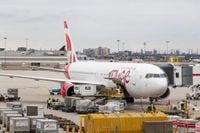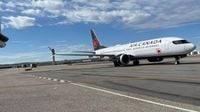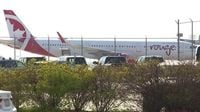Nearly 200 people flying from sunny Las Vegas to a still-frigid Toronto were jolted back to reality with a little more than your average post-trip blues this week when their plane had to make an emergency landing before even making it back into Canada. Air Canada Rouge Flight 1702 departed as usual from the U.S. party city shortly after 11 a.m. PDT on Wednesday, April 16, 2025, but did not make its scheduled 6:30 p.m. EDT arrival at Toronto Pearson International Airport due to a worrying smell of smoke in the cockpit.
Out of an abundance of caution, pilots diverted to Iowa — perhaps the biggest contrast possible after the hustle and bustle of Vegas — landing safely at Des Moines International Airport at 4:10 p.m. local time. After the A321 aircraft was inspected on the ground, as is standard procedure, it was allowed to proceed to a gate, where passengers deplaned. However, they faced delays of more than eight hours until they could board a substitute flight.
This route is a very regular one for the carrier, operating as 1702 at the same time each and every day. Air Canada said in a statement that no injuries were reported as a result of the incident, though we can only assume there were some very frustrated travelers among the 176 who were on board, given that AC1702 didn’t end up landing in Toronto until 2:33 a.m. Thursday.
According to KSNV, an Air Canada flight en route from Las Vegas to Toronto was forced to make an emergency landing at Des Moines International Airport after smoke was detected in the cockpit. The airport confirmed that the plane landed safely at 4 p.m. that day. Officials are currently investigating the cause of the smoke, and no further details have been released at this time.
Des Moines International Airport confirmed that the aircraft landed safely at 4 p.m. and that the airline was in the process of deboarding the plane. A passenger on the flight told KCCI that the entire aircraft smelled like smoke. He reported that the pilot instructed everyone to brace for landing, which happened very quickly.
Des Moines firefighters walked through the plane with infrared cameras to try to find the cause of the smoke but were unsuccessful. Airport officials say they are not sure what caused the smoke. A new Air Canada plane was expected to pick up the passengers in Des Moines around 10 p.m. on Wednesday.
Air Canada spokesperson Sarah Hoodjer confirmed that the aircraft had landed safely around 4 p.m. and that passengers were taken off the plane safely. Arrangements were made by Air Canada to transport the passengers onward to Toronto. It’s expected that the aircraft will be evaluated by experts in the coming days.
In a statement to CBC News, a spokesperson for Air Canada noted, "The A321 aircraft landed normally and as per standard procedure, was immediately evaluated after landing by airport response teams, and then cleared to taxi to the gate." The emergency measure was taken "out of an abundance of caution," according to the Canadian airline.
As travelers from Las Vegas to Toronto often expect a smooth flight experience, the unexpected emergency landing highlights the unpredictability of air travel. Passengers, while relieved to be safe, were undoubtedly anxious as they awaited further information and the arrival of a replacement aircraft.
By the time they finally reached Toronto, many passengers had endured a long, frustrating wait, with some expressing their dissatisfaction with the circumstances. The flight's lengthy delay and the unexpected diversion certainly added an unwelcome twist to their travel plans.
As investigations continue into the cause of the smoke, Air Canada is expected to provide updates regarding the findings and any necessary actions to ensure passenger safety on future flights. The incident serves as a reminder of the importance of air safety protocols and the quick responses of flight crews in emergency situations.
Air Canada has a long-standing reputation for safety, and this incident will likely prompt further scrutiny and preventive measures to maintain the trust of its passengers. In the meantime, those aboard Flight 1702 can only hope that their next journey will be less eventful.
In summary, Air Canada Flight 1702's emergency landing in Des Moines was a stark reminder of the complexities of air travel. With smoke detected in the cockpit, the swift actions of the pilots ensured the safety of all 176 passengers onboard. As investigations into the incident unfold, both the airline and its passengers will be looking forward to clearer skies ahead.






